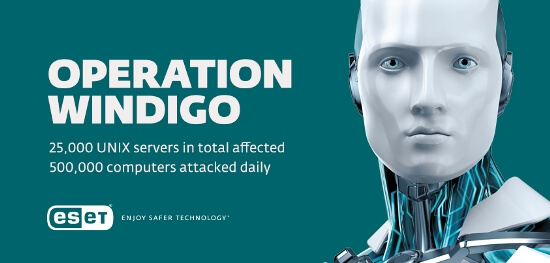Security researchers at ESET®, in collaboration with CERT-Bund, the Swedish National Infrastructure for Computing as well as other agencies, have uncovered a widespread cybercriminal campaign that has seized control of over 25,000 Unix servers worldwide.
The attack, which has been dubbed "Operation Windigo" by security experts, has resulted in infected servers sending out millions of spam emails. Its complex knot of sophisticated malware components are designed to hijack servers, infect the computers that visit them, and steal information.
Victims of “Operation Windigo” have included cPanel and kernel.org.
ESET's security research team, which uncovered Windigo, today published a detailed technical paper, presenting the findings of the team’s investigations and malware analysis. The paper also provides guidance on how to find out if your systems are affected and instructions for removing the malicious code.

OPERATION WINDIGO: Gathering Strength For Over Three Years
While some experts have spotted elements of the Windigo cybercriminal campaign, the sheer size and complexity of the operation has remained largely unrealised by the security community.
"Windigo has been gathering strength, largely unnoticed by the security community, for over two and a half years, and currently has 10,000 servers under its control," said ESET security researcher Marc-Étienne Léveillé.
"Over 35 million spam messages are being sent every day to innocent users' accounts, clogging up inboxes and putting computer systems at risk. Worse still, each day over half a million computers are put at risk of infection, as they visit websites that have been poisoned by web server malware planted by Operation Windigo redirecting to malicious exploit kits and advertisements."
Interestingly, although Windigo-affected websites attempt to infect visiting Windows computers with malware via an exploit kit, Mac users are typically served adverts for dating sites and iPhone owners are redirected to pornographic online content.
An Appeal To Sysadmins To Take Action Against Windigo
Over 60% of the world's websites are running on Linux servers, and ESET researchers are calling on webmasters and system administrators to check their systems to see if they have been compromised.
"Webmasters and IT staff already have a lot of headaches and things on their mind, so we hate to add to their workload - but this is important. Everyone wants to be a good net citizen, and this is your chance to play your part and help protect other internet users," says Léveillé. "The last thing anyone should want is to be part of the problem, adding to the spread of malware and spam. A few minutes can make the difference, and ensure you are part of the solution."
How To Tell If Your Server Has Fallen Foul Of Windigo
ESET researchers, who named Windigo after a mythical creature from Algonquian Native American folklore because of its cannibalistic nature, are appealing for Unix system administrators and webmasters to run the following command which will tell them if their server is compromised or not:
$ ssh -G 2>&1 | grep -e illegal -e unknown > /dev/null && echo "System clean" || echo "System infected"
Tough Medicine For Windigo Victims
"The Ebury backdoor deployed by the Windigo cybercrime operation does not exploit a vulnerability in Linux or OpenSSH," continued Léveillé. "Instead it is manually installed by a malicious attacker. The fact that they have managed to do this on tens of thousands of different servers is chilling. While anti-virus and two factor authentication is common on the desktop, it is rarely used to protect servers, making them vulnerable to credential stealing and easy malware deployment."
If sysadmins discover their systems are infected, they are advised to wipe affected computers and reinstall the operating system and software. It is essential that fresh passwords and private keys are used, as the existing credentials must be considered compromised.
For a higher level of protection in future, technology such as two-factor authentication should be considered.
"We realise that wiping your server and starting again from scratch is tough medicine, but if hackers have stolen or cracked your administrator credentials and had remote access to your servers, you cannot take any risks," explains Léveillé. "Sadly, some of the victims we have been in touch with know that they are infected, but have done nothing to clean up their systems - potentially putting more internet users in the firing line."
All computer users are reminded that they should never reuse or choose easy-to-crack passwords.
Further Information
ESET has published a detailed investigation into the "Operation Windigo" cybercrime campaign, and the various malware components which make up the threat.
To download the full report, please visit here.
To follow the developing story on Facebook, Google+ or Twitter, please use hashtag #windigo.
About ESET
ESET®, the pioneer of proactive protection and the maker of the award-winning ESET NOD32® technology, is a global provider of security solutions for businesses and consumers. For over 26 years, the Company continues to lead the industry in proactive threat detection. By obtaining the 80th VB100 award in June 2013, ESET NOD32 technology holds the record number of Virus Bulletin "VB100” Awards, and has never missed a single “In-the-Wild” worm or virus since the inception of testing in 1998. In addition, ESET NOD32 technology holds the longest consecutive string of the VB100 awards of any AV vendor. ESET has also received a number of accolades from AV-Comparatives, AV-TEST and other testing organizations and reviews. ESET NOD32® Antivirus, ESET Smart Security®, ESET Cyber Security® (solution for Mac), ESET® Mobile Security and IT Security for Business are trusted by millions of global users and are among the most recommended security solutions in the world.
The Company has global headquarters in Bratislava (Slovakia), with regional distribution centers in San Diego (U.S.), Buenos Aires (Argentina), and Singapore; with offices in Jena (Germany), Prague (Czech Republic) and Sao Paulo (Brazil). ESET has malware research centers in Bratislava, San Diego, Buenos Aires, Singapore, Prague, Košice (Slovakia), Krakow (Poland), Montreal (Canada), Moscow (Russia) and an extensive partner network for more than 180 countries. More information is available via About ESET and Press Center.`